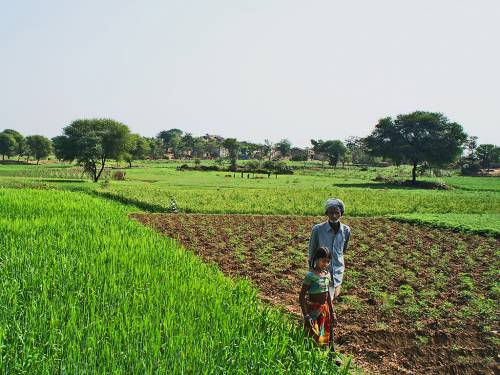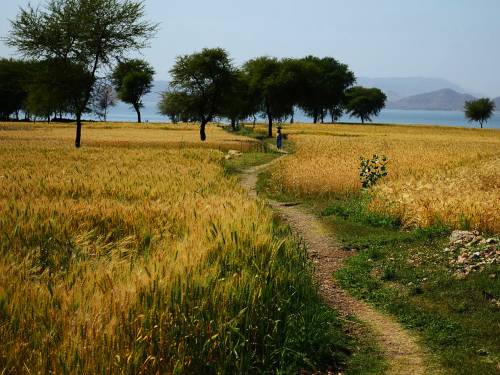Internationally Certified Organic Village!
By UdaipurTimes Team on May 10, 2017

Previously renowned for its lovely farms, lively fish market and electrifying Gavari ceremonies, Jaisamand’s Gati Village has now become a local pioneer in the global organic farming movement.
India’s national accreditation body, the APOF Organic Certification Agency (AOCA) has just certified Gati as Rajasthan’s first fully organic farming community covering all its 290 farm families and their village fields. Since AOCA approval is globally recognized, Gati crops and products can now all be marketed internationally with this prestigious organic validation.

With international certification, Gati’s lush wheat fields turn a new shade of gold.
The certification process took nearly a year and over 40 meetings to get all the villagers on board and committed to its rules and goals. It is step one in the Organic Jaisamand initiative launched by Udaipur’s Big Medicine Charitable Trust (BMCT), administered by Jagran Jan Vikas Samiti (JJVC), and funded by the international Presbyterian Hunger Project (PHP) which invests in the health, sustainability and wellbeing of rural farming communities around the world.

Explaining certification wasn’t easy and a few were worried the government would be angry because it used to keep telling them to start using chemicals.
Project director Pannalal Patel declared, “We congratulate all of Gati for this marvelous milestone, and thank the women farmers especially. They immediately understood the project’s importance for their village’s health and prosperity and they recruited for it tirelessly. Looking forward to this day, they also started Mewar’s first women-owned and run organic production centre to use their pure crops to create badly needed rural jobs and marketable delicacies like gourmet tomato chutneys.”

Gati seed saver guru and OJ project power source, Chamni-bhae
Project supervisor JJVS is well known for reviving Mewar’s organic medical plant gardens and traditional herbal healing; and their CEO Ganesh Purohit observed, “We’re very proud of Pannalal-ji’s work and grateful for PHP’s support, but most credit must go to Gati’s residents who have always protected their fields from agro-chem pollution as part of their native traditions. They have actually been ‘default organic’ for generations, but now the value of their work and wisdom is finally being understood.”

Pannalal attends one of Himti-bhae’s regular village lessons on creating organic pesticides from neem, datura, ashwagandha, lantana, milkweed, tobacco, garlic, buttermilk & cow urine.
Project originator BMCT’s Rita Dixit-Kubiak added, “Organic Jaisamand is the first phase of our Organic Udaipur project to promote organic farming’s environmental, health and economic potential here. Organic consciousness and markets have grown exponentially in India’s metros and abroad, but Udaipur is inexplicably lagging far, far behind.
Project-related Udaipur organic awareness fair at Celebration Mall
“Gati’s certification is a big step forward, but we now need to boost local demand and value-adding businesses. Instead of just being directly exported, Gati crops can enhance Udaipur’s own health and job opportunities. We’re now looking for more local entrepreneurs to turn this bounty into wholesome products as well as media partners to help awaken Udaipurites to the importance of eating and living organically themselves.”
Anyone wishing to help or learn more is encouraged to contact project director Pannalal Patel at +91-946-117-2510 or patelpanji (@) gmail.com

